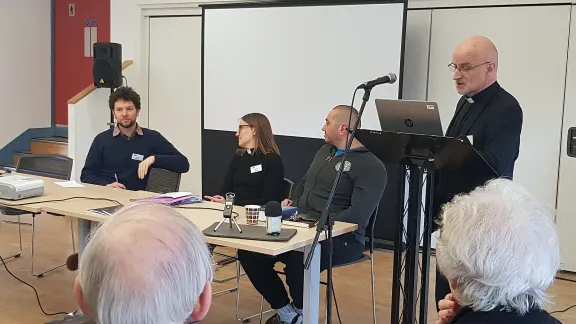
From left to right: Rev. Dr Hugo Adán Fernandez (Holy Trinity with St Matthew parish), Rev. Sarah Farrow (St Anneâs Lutheran Church), Dr Chris Asprey (l' Arche) and Rev. Dr Jaakko Rusama (Lutheran co-moderator, Anglican Lutheran Society). Photo: LWF/P. Bouwman
More than three decades of promoting common witness
(LWI) - Exploring spirituality and living in diversity were key topics of the 2019 general meeting of the Anglican-Lutheran Society in London.
Fifty representatives of churches from the two Christian traditions gathered at St George’s Roman Catholic Church in London to discuss how the theme “Living in Diversity” applies to their different contexts and how spirituality is expressed.
Lutheran co-moderator Rev. Dr Jaakko Rusama, Evangelical Lutheran Church of Finland, reminded participants that the society had been part of the wider ecumenical movement for more than 30 years, promoting a wider knowledge of Anglican and Lutheran traditions and the contemporary developments that affect them. “We want to build bridges, and we have developed a very good network of relationships,” he said at the 23 March gathering.
We want to build bridges, and we have developed a very good network of relationships.
Members of the society are drawn from churches belonging to The Lutheran World Federation (LWF) and the Anglican Communion, and bilateral relations between the two Christian World Communions feature at its regular meetings.
Anglican co-moderator Bishop Michael Ipgrave, Diocese of Lichfield, Church of England, spoke of the need to set the society’s bilateral focus into a wider ecumenical setting. Anglicans and Lutherans, he noted, cannot properly relate to one another without acknowledging the pre-Reformation Christian story which is part of their heritage.
God in the midst of suffering
In her presentation, Rev. Sarah Farrow, assistant pastor at St Anne’s Lutheran Church in London and student chaplain at the Central Lutheran Chapel, affirmed that Lutherans hold a deep awareness of spirituality, rooted in Luther’s theology and faith journey, both manifested in prayer and service.
“Spirituality is not a stairway for us to climb up to God but our experience of God descending every single step of the stairway to come to us,” Farrow said. Her congregation belongs to The Lutheran Church in Great Britain, an LWF member-church.
“This earthly presence of God in Christ Jesus, present in humanity for ordinary people in the toil and trouble of their ordinary lives, this is God located in the midst of our suffering and heartache – a God who cares, who weeps, who yearns, who loves,” she added.
Society members also learned about a bilingual Hispanic-Anglican church in London, which is believed to be the first of its kind to offer services in English and Spanish. Rev. Dr Hugo Adán Fernandez, who founded the congregation in the Holy Trinity with St Matthew parish, Diocese of Southwark, said it bridges both languages and cultures.
“It isn’t that we have just Spanish and English, we have the challenge of the culture of the Spanish-speaking people and the English-speaking people.” Now three years-old, Adán said the congregation stresses belonging rather than over believing.
“Especially for us immigrants to belong to something and to feel that you are at home, and that you can reconnect with your roots and your memories and your background, means a lot,” he noted. “We meet in equal relationship, face to face, without any formality and yet with a deep sense of belonging and of community,” he added.
Other speakers included Dr Chris Asprey, a Roman Catholic member of the L’Arche community in London, which connects people of differing abilities living together as brothers and sisters.
Founded in 1984, the Anglican Lutheran Society has members from all world regions. Its 2020 meeting will be held in Rome, Italy, and will discuss the theme “Finding Forgiveness.”
By Praxedis Bouwman, edited by LWF Communications.


